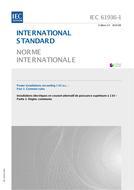Cart 0 Product Products (empty)
No products
To be determined Shipping
$0.00 Total
Product successfully added to your shopping cart
Quantity
Total
There are 0 items in your cart. There is 1 item in your cart.
Total products
Total shipping To be determined
Total
New Reduced price!  View larger
View larger
 View larger
View larger IEC 61936-1 Ed. 2.0 b:2010
M00017455
New product
IEC 61936-1 Ed. 2.0 b:2010 Power installations exceeding 1 kV a.c. - Part 1: Common rules
standard by International Electrotechnical Commission, 08/31/2010
In stock
More info
Full Description
IEC 61936-1:2010 provides common rules for the design and the erection of electrical power installations in systems with nominal voltages above 1 kV a.c. and nominal frequency up to and including 60 Hz, so as to provide safety and proper functioning for the use intended. For the purpose of interpreting this standard, an electrical power installation is considered to be one of the following:a) Substation, including substation for railway power supply;
b) Electrical installations on mast, pole and tower; Switchgear and/or transformers located outside a closed electrical operating area;
c) One (or more) power station(s) located on a single site. The installation includes generators and transformers with all associated switchgear and all electrical auxiliary systems. Connections between generating stations located on different sites are excluded;
d) The electrical system of a factory, industrial plant or other industrial, agricultural, commercial or public premises. The electrical power installation includes, among others, the following equipment: rotating electrical machines; switchgear; transformers and reactors; converters; cables; wiring systems; batteries; capacitors; earthing systems; buildings and fences which are part of a closed electrical operating area; associated protection, control and auxiliary systems; large air core reactor. NOTE: In general, a standard for an item of equipment takes precedence over this standard. This standard does not apply to the design and erection of any of the following:
- overhead and underground lines between separate installations;
- electric railways;
- mining equipment and installations;
- fluorescent lamp installations;
- installations on ships and off-shore installations;
- electrostatic equipment (e.g. electrostatic precipitators, spray-painting units);
- test sites;
- medical equipment, e.g. medical X-ray equipment.
This standard does not apply to the design of factory-built, type-tested switchgear for which separate IEC standards exist. This standard does not apply to the requirements for carrying out live working on electrical installations. This second edition cancels and replaces the first edition, published in 2002. It constitutes a technical revision. The main changes with respect to the previous edition are listed below:
- new table of references for additional agreements between manufacturer/contractor/planer and user/orderer/owner (4.1.2);
- addition of minimum clearances in air not standardized by IEC but based on current practice in some countries (Annex A);
- deletion of nominal voltages (Table 1, Table 2, Clause 5);
- addition of regulations for fuses (6.2.15);
- simplification of regulations for escape routes (7.5.4);
- deletion of special regulations for operating aisles (7.5.4);
- modification of clearances for fire protection (Table 3);
- modification of safety criteria for earthing systems (10.2.1);
- modified curves of permissibly touch voltages (Figure 12, Annex B);
- deletion of numbering of subclauses without headlines;
- change of "should" to "shall" in many cases or change of subclauses with "should" to a note.

